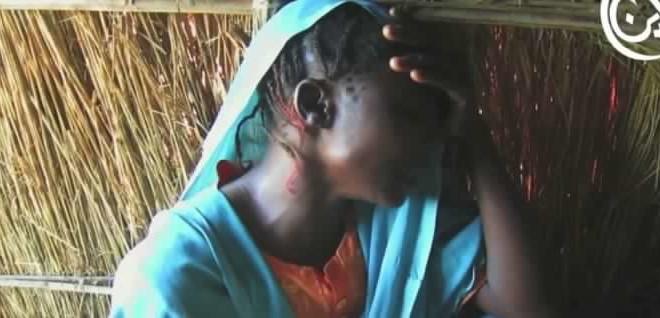The 17-year-old girl was raped at gunpoint by the military officer in her house in Tour village, Central Darfur state
(2 May 2020) The African Centre for Justice and Peace Studies (ACJPS) calls for urgent steps to be taken to investigate and hold to account the perpetrator of rape of a 17-year-old girl reported to the police in Nertiti municipality, Central Darfur state. Sudanese authorities should ensure the allocation of adequate resources and guarantee the protection of the victim and witness in the case. The incident took place on 22 April 2020 in Nertiti.
The alleged perpetrator, an officer of the Sudanese Armed Forces who is a lieutenant stationed at the military garrison of Tour attacked 17 year old Halima (not her real name) inside her house at gunpoint. Reliable information indicate that the victim was on her way back from a market in Tour when she saw the perpetrator in a military uniform following her. He started to harass her verbally and asked her to stop but she did not until she reached home. He followed her all the way to her house and because her family members were not present at the time, the perpetrator followed her inside, threatened her with a pistol and raped her.
ACJPS has reliable been informed that close neighbours ran to Halima’s house when they heard her crying loudly. They found out that Halima had been raped. The neighbours took the victim to the military base and informed the commander of the armed forces and there after reported the incident to the police station in Nerteti. The police filed a case of rape against the perpetrator and then the military police arrested the officer and surrendered him to Nerteti police station.
Halima has been sent to Nerteti Hospital for treatment. She was issued with Criminal Form No 8, a medical evidence form used in criminal proceedings related to death or grievous hurt, and underwent a medical examination that confirmed the rape.
ACJPS calls on the government of Sudan to:
- To immediately ensure that the accused is prosecuted and punished for the rape of the victim and ensure effective remedy for the victim.
- Take all necessary legislative, administrative and other measures to ensure that the victim and children in similar situations are given protection from sexual abuse.
- Immediately put in place measures to protect civilians in and around Nertiti.
Background
Victims of sexual violence and other grave international crimes in Darfur face serious barriers to justice and a climate of endemic impunity for perpetrators.
On 29 June 2017, members of the SAF attacked Golo town, Jebel Marra, central Darfur state. The attack was prompted by the killing earlier the same day of a uniformed SAF officer who, together with four other soldiers, had attempted to rape a group of ten girls collecting water on the outskirts of the town.
During the morning hours, residents of Golo town reportedly responded to cries for help from the group of ten girls at a water pump. Residents attacked the group of five uniformed SAF soldiers who had attempted to gang rape the girls by throwing rocks. They stoned one of the soldiers to death and the others fled to the nearby SAF garrison. A short while later, around 50 SAF officers in uniform returned to Golo Town, armed with submachine guns and small arms. The soldiers raided homes and shops in the market, killing at least eleven people, including four children, and wounding twenty others. Ten women and girls were raped. At least thirty men were arrested from the market and forced to carry goods stolen by the soldiers to the nearby SAF garrison.
The scale of sexual violence in Darfur is likely much greater than any reports indicate. Independent monitors are unable to access most of Sudan’s conflict affected areas and survivors often do not report incidents, due to insecurity, stigma, the fear of reprisal and other obstacles. Among the obstacles are laws and policies that fail to ensure a safe environment for reporting sexual and gender based violence incidents and a consistent failure to prosecute these crimes. Despite recent changes to the definition of the offence of rape in Sudan’s criminal law, the law remains unclear about evidence standards that apply and women who report sexual offences remain at risk of prosecution for adultery or committing “immoral acts” if they fail to prove a rape case.
In addition, many of the international and domestic organisations expelled from Sudan following the ICC indictment provided medical, legal, and psychological services to women, and local civil society groups have faced serious difficulties filling this gap.
To date, the Government of Sudan has not ratified the Protocol to the African Charter on Human and Peoples’ Rights on the Rights of Women in Africa, or the Convention on the Elimination of All Forms of Discrimination against Women (CEDAW), alongside the Optional Protocol to it of 2000
Contact: Mossaad Mohamed Ali (English, Arabic, Swedish): +46 727712782
 African Centre for Justice and Peace Studies ACJPS | المركز الافريقي لدراسات العدالة و السلام
African Centre for Justice and Peace Studies ACJPS | المركز الافريقي لدراسات العدالة و السلام




